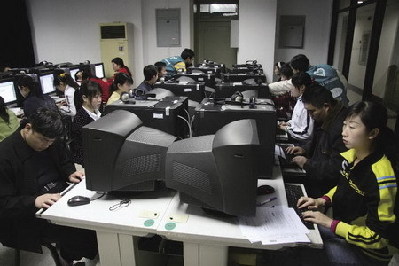On March 6, 2009, the Common School of Peking University, one of China’s most prestigious institutes of higher education, commenced its fourth session. Over the course of six months 102 members of the university’s subsidiary staff, such as chefs and guards, will take classes covering everything from vocational training to social etiquette.
The school, running under the logo “promoting the notion of equality and fulfilling commoners’ dreams,” is intended to explore a new mode of education for migrant workers, whose numbers have reached hundreds of millions across the nation.
Providing General Education
Similar programs were taking place as early as 91 years ago at Peking University. In 1918 the then-university president Cai Yuanpei founded a night class for school laborers. It was followed by a school and a lecture group for subsidiary staff doing odd jobs, sponsored by university students, who were ardent about improving the learning and arousing the consciousness of the populace.
The PKU Common School has disparate purposes. It was in fact started as a research project on continuing education for migrant workers from rural areas by the university’s Graduate School of Education. “We found in our study that these people have a hard time fitting into urban culture and living. A key reason is a lack of schooling and training,” said Prof. Ding Xiaohao.
The university has a big community of approximately 3,000 migrant laborers. The trade union has been exploring ways to better serve them, so the project professors and union leaders soon sensed a chance for fruitful cooperation. In September 2006 the first session of the common school was inaugurated, with an enrollment of 53.

The initial curriculum included social interaction, psychological health, sharing and tolerance, as well as basic computer skills and English. In response to participants’ feedback, it later tilted more towards the first three areas. According to Prof. Ding, migrant workers from rural areas often adhere to rural conventions and habits after moving to the city, which often creates cultural clashes. Leaving behind family members and connections, these people are strangers to the cities they work in, and face a painful acclimatization to urban circumstances. Some guidance makes this process shorter and easier.
The school has now added another class: healthy sex. This is a bold move in a largely conservative society. Sun Li, deputy principal of the school and vice chairwoman of the university’s trade union, is aware of the needs of her students. “Most of the migrant workers in the university are single in their twenties. Better knowledge of sex is important to them.”
Higher Learning Resources Plus Volunteers
Prof. Ding Xiaohao and other members of her research project conducted a survey among the migrant workers at Peking University before launching the Common School. The results showed that the 3,000 or so laborers have an average age of 26.8 years, and 76 percent have six years or less schooling. The majority are aware of the gap between their professional skills and market demands, but balk at further education or training because of limited time (68.5 percent) and the exorbitant costs involved (46.5 percent).
Prof. Ding believes that universities, with a large pool of qualified volunteers among staff members and students, and rich resources in terms of classrooms and teaching facilities, can play a constructive role in the further education of migrant workers.
